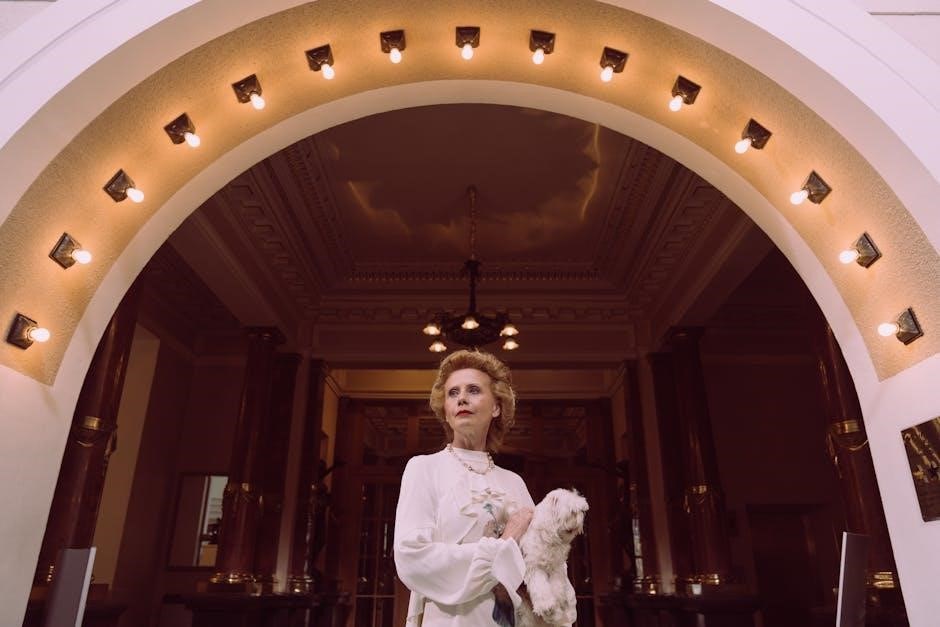“The Guest” by Albert Camus is a thought-provoking short story set in Algeria, exploring themes of moral responsibility and existential choice through the schoolteacher Daru’s encounter with an Arab prisoner.
1.1 Overview of the Story
“The Guest” by Albert Camus is a short story set in Algeria during the French colonial period. It revolves around Daru, a schoolteacher living in a remote schoolhouse on a plateau, who is tasked by a policeman to escort an Arab prisoner to the nearest city. The prisoner is accused of murder, and Daru is torn between fulfilling his duty and adhering to his moral principles. The story explores themes of isolation, moral responsibility, and the complexities of human choice. Camus masterfully crafts a tense and reflective narrative, highlighting the ethical dilemmas faced by Daru as he grapples with the weight of his decision. The setting, a harsh and isolated landscape, amplifies the sense of moral and existential conflict.
1.2 Historical Context and Setting

“The Guest” by Albert Camus is set in Algeria during the French colonial period, a time of cultural and political tension. The story unfolds in a remote schoolhouse on a plateau, where Daru, the schoolteacher, lives in isolation. The harsh, desolate landscape mirrors the moral and existential isolation of the characters. The historical context of French colonialism in Algeria underpins the narrative, as the story touches on the friction between French authorities and the Arab population. The setting—a snow-covered, barren plateau—creates a sense of detachment and emphasizes Daru’s loneliness. The story’s atmosphere reflects the broader philosophical themes of Camus, particularly the absurd and the individual’s struggle to find meaning in a harsh, indifferent world.

Plot Summary of “The Guest”
Daru, a schoolteacher, is tasked by a policeman to escort an Arab prisoner to the city. Torn between duty and morality, Daru faces a profound moral choice.
2.1 The Arrival of the Policeman and the Prisoner
The story begins with Daru, a schoolteacher, observing the arrival of a policeman, Balducci, and an Arab prisoner. The setting is a remote plateau in Algeria, where Daru lives in isolation. Balducci explains that the prisoner is accused of murdering his cousin and orders Daru to escort him to the city. Daru reluctantly agrees, though he is uneasy about the task. The prisoner remains silent, adding to the tension. This encounter sets the stage for Daru’s moral dilemma, as he grapples with his duty and his own sense of justice. The arrival marks the beginning of a complex interplay between obligation and personal ethics.
2.2 Daru’s Moral Dilemma and Decision
Daru, the schoolteacher, faces a profound moral dilemma when tasked with delivering the Arab prisoner to authorities. Torn between his duty as a civil servant and his personal opposition to punishment, Daru struggles with the ethical implications of his actions. He believes in justice but rejects the idea of confinement, viewing it as inhumane. Despite his reservations, Daru prepares provisions for the prisoner, indicating his reluctant acceptance of the responsibility. However, in a pivotal moment, Daru releases the prisoner, allowing him to choose his fate. This decision reflects Daru’s belief in freedom and his refusal to participate in a system he morally condemns. His choice underscores the story’s themes of existential freedom and personal accountability. The act leaves Daru isolated, yet true to his principles.

Themes in “The Guest”
Central themes include moral responsibility, justice, freedom, isolation, and human connection, reflecting Camus’s exploration of individual choice and societal expectations in a morally ambiguous world.
3.1 Existentialism and the Absurd
Albert Camus’s The Guest embodies existentialist themes through Daru’s moral dilemma, emphasizing individual freedom and responsibility. The absurd is reflected in Daru’s isolation and the meaningless situation imposed upon him. His choice to free the prisoner or deliver him symbolizes the existential struggle to create meaning in an indifferent world. Camus highlights the absurdity of colonial authority and societal expectations, showcasing Daru’s internal conflict as a microcosm of human existence. The story critiques colonialism by portraying the futility of imposed justice, aligning with Camus’s philosophy of the absurd and the individual’s quest for authenticity. Through Daru’s silent rebellion, Camus underscores the power of personal choice in defining one’s moral landscape.
3.2 Colonialism and Cultural Conflict
Albert Camus’s The Guest delves into the tensions of colonialism and cultural conflict in Algeria, highlighting the strained relationships between French colonizers and Arab natives. Daru, a French-Algerian schoolteacher, embodies the cultural divide, caught between his loyalty to the colonial system and his empathy for the Arab prisoner. The story reflects the oppressive dynamics of colonial rule, where authority is exerted through force, as seen in the policeman’s demand to deliver the prisoner. Camus portrays the futility of colonial justice and the moral ambiguity it creates, emphasizing Daru’s silent rebellion against the system. The isolated setting of the schoolhouse on the plateau symbolizes the detachment of colonial structures from the indigenous culture, underscoring the deeper clash between oppressor and oppressed.

Character Analysis
Daru and the Arab prisoner are central figures, embodying moral conflict and fate amidst colonial tensions, with Daru’s internal struggle defining the story’s emotional core.
4.1 Daru: The Schoolteacher’s Inner Conflict
Daru, the schoolteacher, embodies a profound moral and existential struggle. His isolated life in the Algerian plateau reflects his detachment from societal expectations, yet he is unexpectedly thrust into a situation requiring a difficult decision. The arrival of the policeman with the Arab prisoner forces Daru to confront his own sense of duty, justice, and freedom. Torn between obeying the law and upholding his personal morality, Daru’s internal conflict mirrors the broader themes of colonialism and individual responsibility. His eventual choice to allow the prisoner to decide his own fate highlights Daru’s belief in autonomy and his rejection of authoritarian structures, showcasing his complex character and philosophical depth.
4.2 The Arab Prisoner: A Symbol of Fate
The Arab prisoner in Camus’ “The Guest” serves as a poignant symbol of fate and existential inevitability. His presence in Daru’s life disrupts the teacher’s quiet routine, forcing him to confront moral ambiguities. The prisoner’s silence and passivity underscore his role as a catalyst for Daru’s internal conflict rather than an active participant. His fate, left uncertain, reflects the absurdity of life and the randomness of human circumstances. Through the prisoner, Camus explores themes of colonial oppression and the dehumanizing effects of societal structures, ultimately leaving the character’s destiny open to interpretation, emphasizing the futility of seeking clear resolutions in an indifferent world.

Symbolism in the Story
Camus employs rich symbolism in “The Guest,” with the isolated schoolhouse and vast plateau representing existential isolation and moral confinement. The snow and desolate landscape symbolize the cold, indifferent nature of the universe, mirroring Daru’s internal struggle. These elements underscore the themes of absurdity and human alienation, creating a visual and emotional backdrop for the story’s profound philosophical inquiry.
5.1 The Isolated Schoolhouse and the Plateau
The isolated schoolhouse and the plateau in Albert Camus’s “The Guest” serve as symbolic backdrops for Daru’s existential journey. The schoolhouse, perched on a remote hillside, embodies Daru’s physical and emotional isolation. Its simplicity and austerity reflect his ascetic lifestyle and detachment from the world. The plateau, with its vast, barren expanse, symbolizes the moral and philosophical vastness of Daru’s dilemma. The snow-covered landscape adds to the eerie silence, emphasizing the cold, indifferent nature of the universe. This setting traps Daru in a space of solitude, forcing him to confront his internal conflicts and the weight of his choices. The isolation also highlights the themes of alienation and the absurd, central to Camus’s philosophy, as Daru grapples with his duty, freedom, and the ambiguity of justice.
5.2 The Snow and the Landscape
The snow and the desolate landscape in Albert Camus’s “The Guest” play a pivotal role in setting the tone and reinforcing the story’s themes. The snow-covered plateau creates a visually stark and isolating environment, mirroring Daru’s emotional detachment and the moral coldness of the situation. The harsh, barren landscape symbolizes the indifference of nature, aligning with Camus’s concept of the absurd. The snow’s purity contrasts with the moral ambiguity of the events, while its silence underscores the stillness and solitude of Daru’s existence. The landscape’s vastness and emptiness emphasize the protagonist’s isolation, both physically and philosophically, as he grapples with his choices and the meaninglessness of the world around him.

Legacy and Impact of “The Guest”
“The Guest” remains a seminal work in existentialist literature, praised for its profound exploration of moral responsibility and the human condition, influencing scholarly debates and literary analyses worldwide.
6.1 Critical Reception and Analysis
“The Guest” has received widespread critical acclaim for its nuanced exploration of moral ambiguity and existential themes. Scholars have praised Camus’s ability to craft a narrative that challenges readers to confront the complexities of justice, freedom, and human responsibility. The story’s setting in colonial Algeria adds another layer of depth, prompting analyses of cultural conflict and the tensions between colonial powers and indigenous populations. Many critics highlight Daru’s internal struggle as a pivotal moment of existential choice, symbolizing the absurdity of imposed moral frameworks. The character’s decision to set the prisoner free has been interpreted as a powerful statement on individual autonomy and the rejection of systemic oppression. Academic studies, such as those by Fernandez and Griem, further explore the philosophical underpinnings of the text, cementing its place in literary and philosophical discourse.
6.2 The Story’s Place in Camus’s Body of Work
“The Guest” holds a significant place in Albert Camus’s literary canon, reflecting his broader philosophical themes of existentialism and the absurd. The story aligns with Camus’s exploration of moral dilemmas and human freedom, as seen in works like The Stranger and The Myth of Sisyphus. It also underscores his interest in colonial dynamics, a theme prevalent in his Algerian-set narratives. Critics note how The Guest exemplifies Camus’s ability to blend philosophical inquiry with concise, impactful storytelling. The story’s focus on individual choice and responsibility resonates with Camus’s broader humanistic concerns, making it a pivotal work in his exploration of ethical and existential questions. Its concise structure and profound themes further highlight Camus’s mastery of the short story form.

